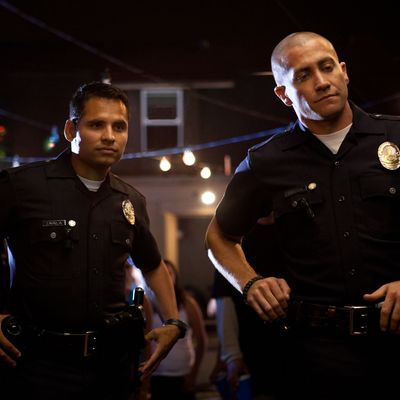
There’s nothing in David Ayer’s cop drama End of Watch that you haven’t already seen, but the film has moments so riveting that you might not care too much. Ayer has done the macho police thing before: He wrote the momentous Training Day (2001), in which a very angry Denzel Washington played a crooked cop, and he wrote and directed the problematic-but-compelling Harsh Times (2005), in which an even angrier Christian Bale played a crooked vet trying to become a cop. The characters in End of Watch match the ones in those films for sheer jacked-up explosiveness, but this time, the boys in blue are never actually dirty — though they are rowdy, arrogant, and occasionally even stupid. Gone are the moral complications and ethical gray areas of Ayer’s earlier work: Ably played by Jake Gyllenhaal and Michael Pena, young partners Brian Taylor and Mike Zavala always stand on the right side of the law, in between bouts of jawing at each other or talking about their girls. And in a movie world where cops are always expected to be compromised in some way, these guys are refreshingly old-fashioned.
Perhaps needless to say, it’s that do-the-right-thing attitude that causes our heroes some trouble, as they get a little too in the way of a Mexican drug cartel that’s taken foothold in the slums of Los Angeles. But who can blame them, when the cartel is doing inexplicably evil things like chopping people up and leaving their body parts rotting in pools of blood and filth in abandoned buildings? Along the way, we also get a somewhat-cloying look into the personal lives of our cop-heroes, including Taylor’s budding romance with a young scientist (a subplot that would have been insufferable, were it not for Anna Kendrick’s winning presence). The one newish twist here is that Taylor is also in school, and he’s shooting his life as a cop for a film class, which means that there’s a lot of energy expended to establish the POV style of the film. Not only is Taylor repeatedly seen holding, reaching for, or situating a camera, but the gangsters are going around recording their exploits as well, it turns out. (Are they all in the same class?) All in all, the gimmick feels like a bit of a waste and a distraction, since there’s plenty in the film that clearly wasn’t shot by one of these narratively established cameras. Interestingly, though they too have cameras, the film never seeks to understand its villains; they remain looming, unknowable, monstrous presences, even in their rare intimate moments.
Luckily, for most of the movie’s running time you won’t have a chance to be distracted, because End of Watch is often dizzyingly intense. That’s not because Ayer is a great action director — he’s serviceable at best — but because he has a genuine feel for the equal-opportunity macho bluster of the streets (both the cops and the criminals front like nobody’s business) and for his attention to the details of police work. That, together with the film’s faux-doc style and its grimy locales, might suggest that the director is working some kind of neorealist angle here. But as End of Watch descends ever deeper into outrageous depravity, as the cops discover ever more horrific crimes, and as the nauseating sense gathers that they’re rapidly approaching some truly awful denouement, you begin to realize that this is more a descent into Hell than it is a realistic portrait of criminality today. But Ayer doesn’t quite have the sensibility to turn the whole thing into a metaphor. His film lacks the epic scale and visual poetry of a Michael Mann movie, even though it occasionally recalls some of Mann’s work. True, some will find all this a bit too cartoonish — catastrophic, unthinkable evil meets cops so good that they get reprimanded by their superiors for not shooting suspects — but we’re in capable hands here. Ayer and his cast appear to have so convincingly nailed the way these characters talk and act that you might not even notice the film slipping from workaday grit into out-and-out myth.





